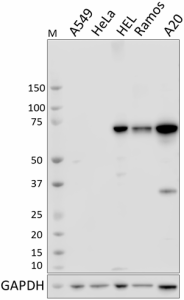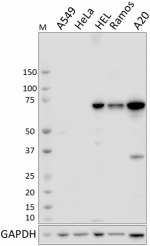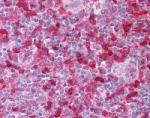- Clone
- SYK-01 (See other available formats)
- Regulatory Status
- RUO
- Other Names
- Spleen tyrosine kinase, protein tyrosine kinase SYK
- Isotype
- Mouse IgG1, κ

-

Total cell lysates (15 µg total protein) from A549 (negative control), HeLa (negative control), HEL, Ramos, and A20 cells were resolved by 4-12% Bis-Tris gel electrophoresis, transferred to a nitrocellulose membrane, and probed with 0.5 µg/mL (1:5000 dilution) of purified anti-Syk antibody, clone SYK-01, overnight at 4°C. Proteins were visualized by chemiluminescence detection using HRP goat anti-mouse IgG Antibody (Cat. No. 405306) at a 1:3000 dilution. Direct-Blot™ HRP anti-β-GAPDH Antibody (Cat. No. 607904) was used as a loading control at a 1:50000 dilution (lower). Lane M: Molecular Weight marker. -

Formalin-fixed paraffin-embedded human tonsil tissue was stained with SYK-01 at 10 µg/ml and developed with an alkaline phosphatase chromogen substrate (red color). Tissue was counterstained with H&E (blue/pink). Magnification, 40X.
| Cat # | Size | Price | Quantity Check Availability | ||
|---|---|---|---|---|---|
| 626201 | 25 µg | $118.00 | |||
| 626202 | 100 µg | $293.00 | |||
Syk is a cytoplasmic 72 kD non-receptor tyrosine kinase that is widely expressed in hematopoietic cells. The Syk kinase associates with a number of proteins including c-Src, Lck, Lyn, Fyn, Vav1, STAT3, SHP1, Grb2, and LAT to couple immunoreceptors to downstream signaling events mediating cellular proliferation, differentiation, and phagocytosis. Syk is modified by phosphorylation on multiple tyrosine sites. The SYK-01 monoclonal antibody (raised against amino acids 5-360 of human Syk) recognizes human, mouse, and rat and Syk and has been shown to be useful for Western blotting, immunoprecipitation, and immunohistochemistry.
Product Details
- Verified Reactivity
- Human, Rat, Mouse
- Antibody Type
- Monoclonal
- Host Species
- Mouse
- Immunogen
- Partial recombinant (amino acids 5-360) human Syk
- Formulation
- Phosphate-buffered solution, pH 7.2, containing 0.09% sodium azide.
- Preparation
- The antibody was purified by affinity chromatography.
- Concentration
- 0.5 mg/ml
- Storage & Handling
- The antibody solution should be stored undiluted between 2°C and 8°C.
- Application
-
WB - Quality tested
IHC-P - Verified
IP - Reported in the literature, not verified in house - Recommended Usage
-
Each lot of this antibody is quality control tested by Western blotting. For Western blotting, the suggested use of this reagent is 0.25 - 0.5 µg per ml. For IHC, use a 10 µg/ml dilution of antibody for staining. Antigen retrieval for IHC of formalin-fixed paraffin-embedded tissue using 0.01 M sodium citrate buffer is recommended. It is recommended that the reagent be titrated for optimal performance for each application.
- Application Notes
-
Additional reported applications (for the relevant formats) include: immunoprecipitation.
This clone may produce a non-specific band of roughly ~250 kD at higher antibody concentrations
This clone does not recognize ZAP70
This clone has been reported to recognize rat Syk -
Application References
(PubMed link indicates BioLegend citation) -
- Arudchandran R, et al. 2000. J. Exp. Med. 191:47. (IP WB)
- Swann PG, et al. 1999. J. Biol. Chem. 33:23068. (IP)
- Inoue M, et al. 2011. J. Immunol. 186:18. PubMed
- Hatterer E, et al. 2011. Neurosci Res. 70:172. PubMed
- Cunningham CC, et al. 2012. Clin Immunol. 144:228. PubMed
- Alsadeg A, et al. 2014. J Immunol. 193:268. PubMed
- Product Citations
-
- RRID
-
AB_2200268 (BioLegend Cat. No. 626201)
AB_2200268 (BioLegend Cat. No. 626202)
Antigen Details
- Structure
- Non-receptor associated tyrosine kinase, contains 2 SH2 domains, 72 kD
- Distribution
-
Cytoplasmic protein, widely expressed in hematopoietic cells
- Function
- Couples immunoreceptor to downstream signaling events that mediate cellular responses including proliferation, differentiation, and phagocytosis
- Interaction
- c-Src, Lck, Lyn, Fyn, Vav1, STAT3, SHP1, paxillin, FAK, Grb2, CD3ε, LAT, many others
- Modification
- Phosphorylation (Y131, Y323, Y348, Y352, Y525, Y526)
- Biology Area
- Cell Biology, Immunology, Signal Transduction
- Molecular Family
- Protein Kinases/Phosphatase
- Antigen References
-
1. Taniguchi T, et al. 1991. J. Biol. Chem. 266:15790.
2. Toyabe S-L, et al. 2001.Immunology 103:164. - Gene ID
- 6850 View all products for this Gene ID
- UniProt
- View information about Syk on UniProt.org
Other Formats
View All Syk Reagents Request Custom Conjugation| Description | Clone | Applications |
|---|---|---|
| Purified anti-Syk | SYK-01 | WB,IHC-P,IP |
Compare Data Across All Formats
This data display is provided for general comparisons between formats.
Your actual data may vary due to variations in samples, target cells, instruments and their settings, staining conditions, and other factors.
If you need assistance with selecting the best format contact our expert technical support team.


